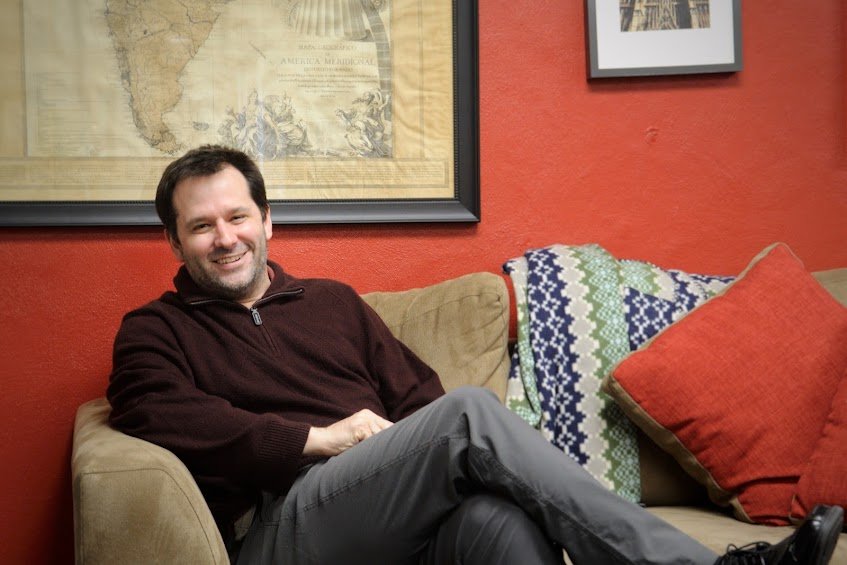Dr. Martínez: World Traveler
By: Isaac Brown
Photographed by: Raeleigh Cadd
Among the things not recommended by the Semester Abroad Program: sleeping under a bridge; sleeping on people’s roofs; sleeping in a bush; returning to sleep in that bush again.
Among the things Dr. David Martínez has done: slept in such places.
Growing up in Spain, Martínez traveled often to Germany, France, and other parts of Europe during his early life. Clearly the perfect candidate for the head of the Semester Abroad Program, he’s done about everything advisable and inadvisable one can do in travel (barring the most hazardous examples). For those of us who are interested in Juniors Abroad, Study Abroad, or in any sort of wandering, there’s a lot to learn from the program director’s stories. Here are a few lessons he shared in a recent interview, along with some of his best stories, though I’m omitting enough content to fill a small book.
Photographed by Raeleigh Cadd
Some of his best stories were from his college days, when he would take stints to South America, Europe, and anywhere else he could. One of his main sagas came after a semester abroad in Klaipėda, Lithuania, when Martínez started across Europe with a friend, aiming to end up in Madrid, Spain in about two months. At a train station, his friend asked where they wanted to go; Martínez said, “I dunno… Rome?” They laughed for a while then, because they realized they could just say they were going to Rome and then go. Structured travel has its merits, but much is gained by dropping your itinerary. “[Y]ou don’t always know what you want to see until you see it, and there’s a lot you won’t see if you’re not willing to wander,” Martínez said. He set out with about $800 and lived on mainly bread and cheese, earning a little cash from playing guitar and singing in the streets and bars. Sure, his lack of plans did get Martínez into some uncomfortable situations (lots of sore mornings from sleeping on the ground), but he said that there’s very little to be concerned about when traveling if you don’t ride a motorcycle drunk or without a helmet, or go swimming in open waters. If traveling stupidly is going to remote locations without an air-conditioned bus, Martínez encourages all students to travel stupidly.
Photo Courtesy: Dr. David Martínez
In many of his stories, Martínez would travel with a friend, but he said that when traveling solo, “you’re never alone if you don’t want to be.” Near Germany, Martínez joined a protest march just to connect with the locals. And when he asked a woman what they were marching for, she (being a German speaker) said: “Kill babies!” This was cause for concern, but after a clarifying question, she quickly said: “No! No kill babies!” And he kept on with the march. Another time, he was willing to jump in a car with an Istanbulite who, speaking almost no English and insisting that he was “Jimmy,” drove him at hazardous speeds to a motel where, for $7 a night, he could get a room and two multi-course meals. Almost everywhere he’s traveled, Martínez has been met with incredible hospitality and has never found a lack of kind and interesting people so long as he’s been willing to be around others: he’s been invited into homes because he told a good joke, or gotten rides just for sticking out his thumb. Martínez says that Americans have a tendency to isolate in travel and not bother to learn the local language, and he sees this as one of the greatest detriments to the experience, since much of a place is not just the sights and the history, but the people.
When talking about his two years in Taiwan, Martínez said that he wanted to “go somewhere where [he] didn’t even know what the signs said.” This is perhaps not the most appealing philosophy to many, but the greater the difference in culture and language, the more there is to experience. Dr. Martínez chose to study abroad in Lithuania because he didn’t know anything about it; and though this might have led him to embarrassing attempts at speaking Lithuanian, that’s the sort of thing he is thrilled to recall. During his twenties, he gave up summers during college and a well-paying job in Knoxville, Tenn., just to travel; since then, he’s given up still more to do the same. And he doesn’t seem to regret it a bit.
Photo Courtesy: Dr. David Martínez
Now, we can’t recommend everything Martínez has done, and he wouldn’t either. But in his advisable and inadvisable travels, there’s plenty to learn, or, at the very least, there’s a great story.



